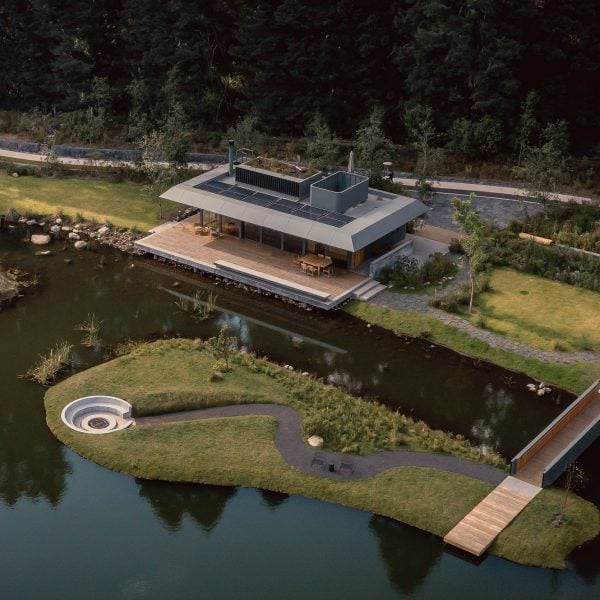Mexico City architecture studio HEMAA utilised a steel structure and green-coloured eaves for Pabellón de la Reserva, a meeting place sited on the marshy shores of a lake in the mountains of central Mexico.
Pabellón de la Reserva – Reserve Pavilion – was built to be a gathering space on the shores of a small lake in the Santa Fe Reserve outside of Mexico City.
The 263-square-metre structure sits low alongside the lake, anchored by reinforced concrete foot foundations that reach into the wet ground, and, where the structure’s patio extends, into the lake itself.
It has a structure made mostly of recycled steel, with low-hanging eves painted green to help it blend into the environment as the owners host events and retreats.

“The Pabellón de la Reserva is anchored by a delicate framework, with cantilevered eaves in an ash-green shade that blends with the surrounding environment,” HEMAA founder Santiago Matos told Dezeen.
“This design choice blurs the structure’s boundaries, framing the natural landscape with subtlety,” he continued.
“The architectural structure not only defines space but establishes a rhythm that harmonizes with its surroundings, creating a serene, airy atmosphere that invites visitors to engage with the beauty of the setting.”

Recycled steel columns frame floor-to-ceiling glass hemmed in by a wrap-around path that extends out to the concrete path.
The roof of the structure has a single smokestack that gives the property a rural silhouette as well as planters and solar panels to add to its self-sufficiency.

HEMAA told Dezeen that they are on track for Living Building certification, a high international standard for sustainability.
The recycled steel makes up almost two-thirds of the structural steel and cladding and was sourced within 500 kilometres of the site, according to the studio.
Adjacent to the structure is a sophisticated rainwater gathering system and a miniature treatment plant concealed by wetland landscaping that utilises small artificial wetland filtration elements as well as industrial techniques.

Inside, the pavilion has a simple layout designed with interior studio Dirección MX with an open living space set up like a combination living and dining room.
A smaller section to the side holds the kitchen and bathroom facilities.

FSC-certified wood clads much of the interior. It features a built-in entertainment system as well as an elegant wood screen that covers the floor-to-ceiling windows to provide privacy from the adjacent road.
The structural steel beams that constitute the ceiling of the structure were left open and serve as skylights. The planting boxes on the roof are hollow and have openings on the side that let light into a void in the ceiling area, bringing additional natural light into the interiors.

A central Japanese-style paper pendant chandelier hangs through the gridded ceiling structure, and, when its dark can be seen illuminated from a distance – even across the lake.
“Designed to host cultural events, workshops, and meetings, it encourages community engagement and a deeper appreciation of nature,” said Matos.
“Its open, flexible layout accommodates a range of activities – from intimate gatherings and conversations to larger events –enhancing its role as a dynamic and inclusive space for shared experiences.”
A stone path leads from the patio to a wood-and-steel bridge that leads to a small landscape island designed by Hugo Sánchez Paisaje. On the shore, the studio included a built-in concrete conversation pit with a central fire pit.

Based in Mexico City, HEMAA has also completed a pair of stone-clad houses in the city and renovated a 1950s modernist home.
The photography is by César Béjar.
Project credits:
Architecture: HEMAA
Engineering: Grupo BVG
Landscape design: Hugo Sánchez Paisaje
Interior design: Dirección MX in collaboration with HEMAA

